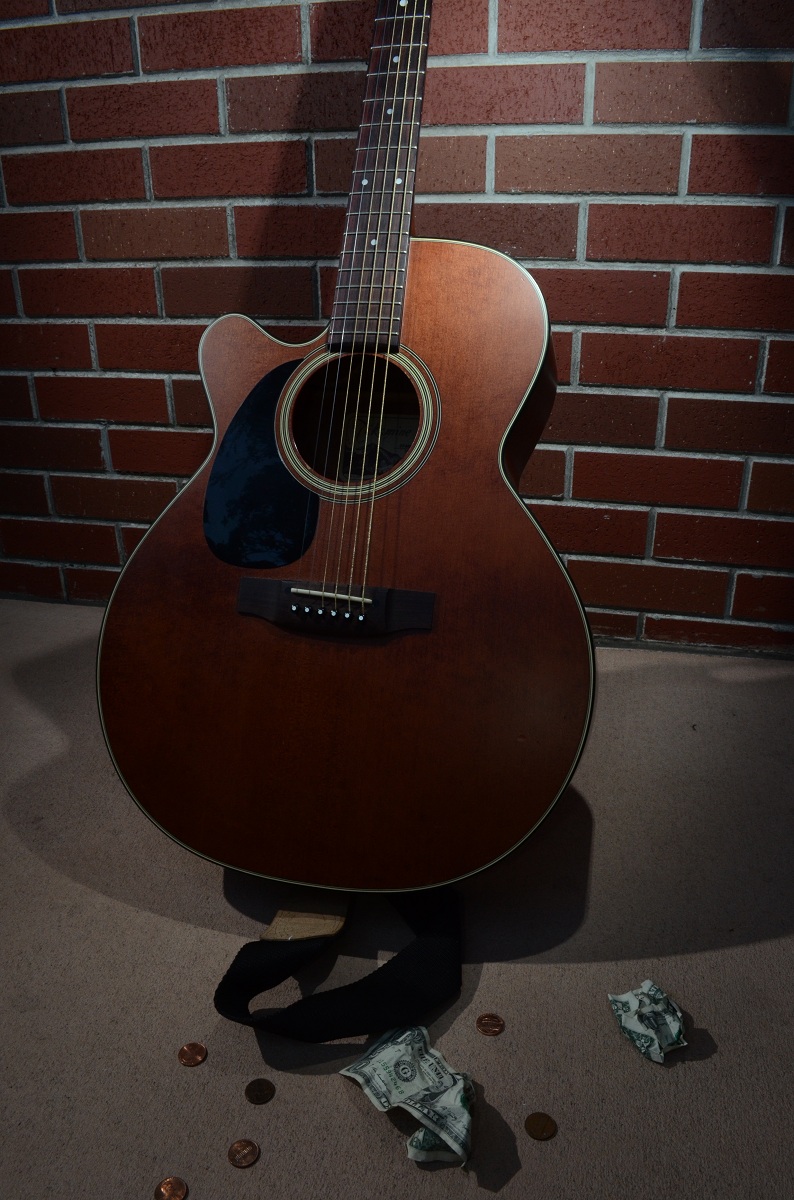Downtown St. Petersburg is artistically comparable to other major cities around the country, holding its own in entertainment, nightlife and museums. But unlike the other cities in its league, there is not a very large presence of street performers. Why this gap in culture?
The art of street performing is commonly referred to as busking. Musical acts are the most frequent display, though busking options are pretty much limitless—street magic, juggling, poetry and street theatre all count, too.
In St. Petersburg, Chris Brudy is a bastion for busking. Locals have come to know him as a common sight, strumming his guitar in front of Fortunato’s Pizza on Central Avenue and outside of the weekly Saturday Morning Market. He has been busking full-time for about four years, and compares the occupation to a high-beta stock investment.
“It’s what I’m doing for a living right now. When times are poppin’ it’s pretty good,” Brudy said. “When they’re not, it can be real bad.”
Most of the time, he gets a great reception. Johnny Cash songs are by far his most requested.
“Everybody from the street dummies to the yuppies likes Johnny Cash,” Brudy said.
He’s not afraid to assert his political leanings. He does footwork for the local Democratic party in his spare time, and encourages anyone who he talks with to vote the straight ticket in November. After elections are over, Brudy wants to try booking bigger and better shows than the bars he has played in the past, and to showcase some of his own material for a change.
“I’ve done this long enough to get my chops up,” Brudy said.
St. Petersburg seems like a place where street performance would be welcomed and abundant, given its many local bands and art initiatives. A thriving creative community and a high pedestrian count present the perfect opportunity. For some artists, street performance can provide invaluable exposure and experience, and a supplement to their day jobs. It can also offer a productive means of income for homeless people who have some talent and would otherwise be panhandling.
This last factor might be where the problem lies. Busking often gets incorrectly associated with panhandling. St. Petersburg has a strict panhandling ordinance, making it a misdemeanor offense to ask for money in most of downtown without a permit or vendor’s license. But as long as buskers don’t directly ask for money and no sound ordinances are being broken, their art is perfectly legal. The St. Petersburg Code of Ordinances even makes a special provision that clarifies the difference between panhandling and busking.
“The term ‘panhandling’ shall not include the act of passively standing or sitting, performing music, or singing with a sign or other indication that a donation is being sought but without any vocal request other than a response to an inquiry by another person,” reads Sections 20-79 on panhandling.
There are some restrictions on hours and location for busking in St. Petersburg, meant to preserve some peaceful hours for residents and prevent obstruction of local businesses. Potential buskers can easily obtain this information by contacting the city before they play.
“If you’re on the sidewalk, that’s public property,” said Officer Les Miller of the St. Petersburg Police Department. So long as you’re not intimidating passersby or aggressively panhandling, you’re probably not going to be bothered.”
He said that even when busking restrictions are in place in cities, they are often not enforced unless there is a real disturbance. These discrepancies are probably a major reason there are few regulars.
Brudy said he generally hasn’t been bothered by law enforcement, unless someone complains about him.
Locals aren’t accustomed to busking like they are in bigger cities such as New Orleans and New York City, where it is a cultural staple. Many well known American artists got their start on street corners, including Bob Dylan, The Violent Femmes, Frank Sinatra, Norah Jones and Benjamin Franklin—but all of them were in major cities. Busking culture has yet to catch on in Florida’s smaller municipalities.
Besides Brudy and a few other regulars, there aren’t many buskers around, and virtually no young performers. Musicians are big part of the Saturday Morning Market, but performing there requires amplification that is beyond the means of many buskers.
Many locals and business owners support street performance, as long as it doesn’t become a nuisance. Advocates say it turns panhandling into something productive and makes the community more vibrant.
“I’m all for displays of the arts,” said Dan Zinc, a St. Petersburg resident of six years. “Not everybody can get a gig in a bar. You have to start somewhere. Busking is one thing—panhandling is another.”
A few Florida cities are notoriously severe about busking. Orlando has had heated debates about what should and shouldn’t be allowed—current measures are very restrictive. In Ybor, a saxophone player was arrested in 2007 on charges of “vending” without a permit. He was not asking anyone for money, only accepting tips. First Amendment attorney Luke Lirot posted his bail.
The ACLU has been active in defending street performer’s rights, filing lawsuits on behalf of banned or arrested artists. They deem any restrictions on public performance an assault on free speech. Busking is protected under the First Amendment, they argue, and cannot be banned but only limited to certain times and places. Additionally, if one from of free speech is allowed in a public place, all forms must be allowed. Cities can’t allow protest on a certain corner but restrict busking. The ACLU and other proponents of free speech also consider any permit requirements an encroachment.
There hasn’t been much contention in St. Petersburg, though it may be because not many are performing. Nevertheless, the pursuit of a new medium of art awaits any who dare try their luck on the streets.
In the meantime, Chris Brudy will be there.



